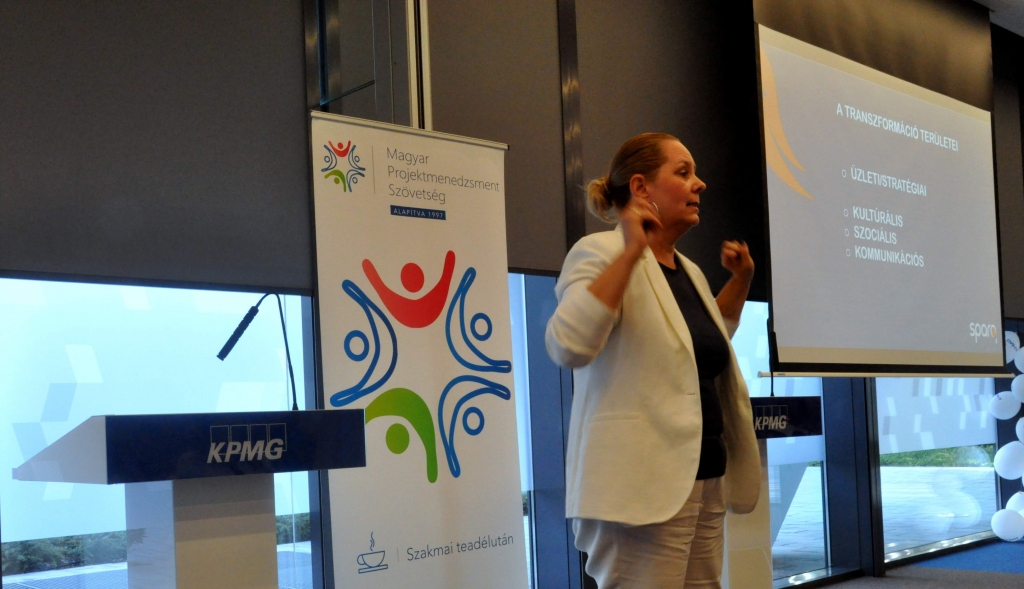I rarely have the chance to attend lectures that cover all the topics that are professionally relevant to me, so I was particularly happy to hear a presentation by organizational psychologist, Julia Füredi dr., at the September club of the Hungarian Project Management Association in Budapest. A former HR director at Unicredit Bank, she’s the owner of a start-up company, called Sparq, which has developed an app for companies to detect social networking trends within the organization. She’s a regular keynote speaker at major conferences and forums sharing her organizational transformation related experiences with IT, banking and HR professionals.
She started her presentation with shocking statistics: 93% of organizational transformation projects fail today. Leaders are under pressure to restructure their company to better meet market expectations and satisfy all customer demands but they do not know how to do it.
The pitfalls of transformations
According to management guru, Peter Drucker, organizational culture eats strategic initiatives for breakfast, albeit it’s not exactly obvious what we mean by “organizational culture”. By traditional definition, culture is the way people think and behave in an organization, “the way we do things”. But how can we influence it to make business transformations successful? Currently, it’s in the hands of HR to improve organizational culture, but it’s often limited to completing a satisfaction survey with employees once a year, which makes little sense. This is not how we should measure cultural fitness of the business.
In 2019, an international NGO, Amnesty International, was in the news for its internal transformation program, which led to the suicide of two employees. An investigation into the case resulted in a 50-page report, which named harassment at work, or “mobbing”, being at the root cause of the suicides.
Business transformation programs take deadly toll in other companies, too. France Telekom‘s general management was put under trial in 2019, for the suicide of about 35 employees in 2008-2009 due to the toxic behavior they demonstrated when restructuring the company during the economic crises. Employees at Google go to the street to protest against abusive work environment in the company. And the list goes on. Organizational culture can undermine transformation, and without a change in mindset it will never be successful.
According to Füredi, one of the reasons why business transformation projects fail is that cultural readiness of the organization is left out of the plans.
Requirements of a successful organizational transformation
Besides an appropriate business strategy and mindset change it is also essential to understand the social networks that operate across the organization before we kick off a business transformation initiative. Füredi quotes László Barabási-Albert, a world renown social network scientist, who argues that it is informal networks, made up of small size interconnected units within the organization, that will facilitate the flow of information across organizational silos. It is important for the successful operation of the company that these micro units of people properly connect to one another to facilitate information exchange.  The fourth important aspect of a successful transformation is the establishment of appropriate communication channels within the organization. Today, there are more and more apps, such as the Facebook workplace, which help employees communicate and build communities within the organization. The goal is to keep all employees within the information circuit of the company, no matter whether they are on maternity leave or physically far away from the centre of the company.
The fourth important aspect of a successful transformation is the establishment of appropriate communication channels within the organization. Today, there are more and more apps, such as the Facebook workplace, which help employees communicate and build communities within the organization. The goal is to keep all employees within the information circuit of the company, no matter whether they are on maternity leave or physically far away from the centre of the company.
Key ingredients for changing organizational culture
- A good amount of organizational courage is needed. Multinational companies have a culture of fear due to a lack of appropriate information
- Intrapreneurship that breaks down silo thinking: reaching across the boundaries of one’s functional unit to establish informal relationships with other business units
- Transparency of goals and priorities of senior executives so that everyone understands where the company is going
- Curiosity of employees to develop themselves professionally, such as writing blogs, or going to conferences
- Performance feedbacks on a regular basis, not just once a year!
- Sharing information instead of withholding, manipulating or abusing it
- Recognizing individual contribution: employees have a clear understanding about how their work contributes to the organization’s success.
- Passion in what we do because this is the energy which is needed to change

 Most important questions to answer before we start a transformation project
Most important questions to answer before we start a transformation project
The most important question to ask before we begin to transform our organization is why we do it, what needs to be transformed and what is the business case. Then we need to know who will be involved and what changes are expected. The need for change may come from within the company or outside of it, from top management, or from the staff, no matter where the idea is born, just give it a start. To make such a project successful you will need a serious commitment from senior management as well as from HR, and you will need a dedicated project team, and if possible, a BIG4 consultancy company who have already seen such a project before, and can provide expertise and guidance. The company must also know upfront that such an initiative is costly and resource intensive and significant changes will happen to the organizational structure, processes, systems, and way of working.
As there aren’t many successful transformation projects on the market yet, it is difficult to estimate how long it will take, and how change will be measured in the future. The failure rate of a transformation project can be significantly reduced if we evaluate before the project the transformation ability of the organization, for example, by conducting internal social network research.
Finally, Füredi also talked about the importance of creating “psychological safety” within the project team for successful collaboration and team cohesion. Team members need to feel safe to make mistakes, ask questions and challenge the status quo. Successful organizational transformations rely on well-functioning teams and people who catalyze change – no matter where they are in the organizational hierarchy. Similarly to the choreographer of the French Tutu company who captivated the audience of the Lyon Dance Theater after their stage performance:
Dr. Julia Füredi is one of the founders of a start-up company, registered in the UK, which has developed an app, called Sparq, to analyse social network trends within companies.



